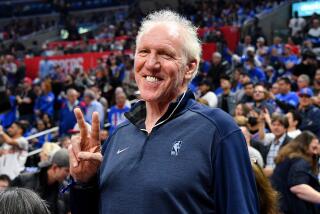Elliott’s Comeback Complete With Win
- Share via
INDIANAPOLIS — Bill Elliott closed his eyes and put his hands over them, to keep the tears back ... and heaved out one hard sob.
Twenty-seven seasons of NASCAR racing--and this was as close as he’d ever come to weeping at a racetrack.
Forty-three Winston Cup victories, including two Daytona 500s, yet he made Sunday’s Brickyard 400, quite clearly, the most emotional win of his roller-coaster life.
“It feels,” he said with difficulty, “like it’s taken me a lifetime to get here.”
“Here” was a place Bill Elliott could not yet seem to pinpoint.
But if you’d known him those 27 seasons, you knew exactly where he’d arrived on this sweltering afternoon at Indianapolis Motor Speedway.
“Here” was where, at last, Elliott, 46, could actually love and savor winning. He hadn’t been able to do that in his prime.
He’d gone from gangly, bashful North Georgia mountain youth in the ‘70s ... to soaring, stunning winner out of nowhere in the ‘80s, with a Huck Finn image that was never real ... to an emotional vertigo at the height of his stardom that made him a surly, troubled winner ... then into a decade down the slippery slope, far over the hill in the eyes of the media--on the rare occasions he was mentioned in the media at all.
Winning wasn’t much fun for Elliott, back when he was winning big. Often, it even seemed to hurt. He’d squirm and wince amid gaggles of reporters and say, “I don’t know how to answer all these QUESTIONS!”
Sometimes he seemed to wonder why he had ever ventured beyond little Dixie Speedway in the foothills north of Atlanta. All he’d ever wanted was to race in peace.
And so after he arrived at the top with tremendous force, as Awesome Bill From Dawsonville with 11 wins and the Winston Million bonus in ‘85, he could find but one sanctuary from the frenzy all around him.
Inside his race car in those days, running flat-out, dominating all the competition--from the aging Richard Petty to the onrushing Dale Earnhardt--Elliott would lapse into an amazing tranquillity. He could think, almost meditate, inside his hurtling cocoon.
And that is how you knew Sunday afternoon that Elliott is really back. And it’s why you believed what he said after the race, when it would have sounded contrived coming from any other driver.
During and after his complete command of the Brickyard 400, Elliott said, he was thinking of loved ones who had passed on: From his grandmother--Miss Audie, they called her; she could remember the years before moonshine cars, when the liquor was hauled out of the hollows with mules and wagons ... to his father, George, who’d set his three sons to racing on a shoestring budget of profits from a junkyard and a small Ford dealership ... to his gutsy, talented nephew Casey, his elder brother (and onetime crew chief) Ernie’s son, who was to have been the next star Elliott driver but died of cancer.
“All I could think about was all those folks.... I feel like all those people were right there in the car with me today--from my dad, my nephew, to my grandmother, my grandfathers--you know, just kind of holding their hands around me, making me make the right decisions.”
He wished more than anything that they could have been here on this day. Maybe that was because all the big winning was so troubled when they were alive that none of them could enjoy it thoroughly, deluged as they were by the encroachment of the American public and media upon tiny Dawsonville, Ga.
He wished that they could be here, now that he had learned to love it.
“I got a second chance in life,” he said. “This man gave it to me.”
Beside him sat Ray Evernham, the team owner who two years ago plucked the aging Elliott off the has-been heap and injected him with an enormous shot of faith and confidence.
Evernham had been the crew chief who sent Jeff Gordon to stardom in the ‘90s, then quit Gordon’s powerful Hendrick Motorsports team in ’99 to spearhead Dodge’s new factory-backed effort in NASCAR.
Evernham saw in Elliott what many had forgotten or ignored: Elliott hadn’t lost his finest trait, his smoothness and precision, more the touch of a Navy fighter pilot than a NASCAR driver.
When Evernham was bringing Gordon along, “Bill would come over and talk with us about [chassis] setups,” Evernham said. Elliott in his prime had actually done all his own work on his chassis.
Evernham could see that Elliott knew the cars piece by piece, inside out. And on the track, “There are just certain things that great drivers do,” Evernham said. “Like today, there were critical things that Bill had to execute. The great ones always execute without mistakes. Like the way he set up Rusty and passed him today.”
That winning pass on Rusty Wallace was surgical, meticulous, impeccable. That made two victories in eight days for Elliott, who’d won at Pocono, Pa., last Sunday.
For all Elliott’s years of doldrums, Wallace wasn’t in the least surprised at the resurgence.
“We’d seen him in the ‘80s, when he was flying,” Wallace said. “And Bill hasn’t lost a thing.”
But he had gained the most important component of his racing career: the joy of winning.
More to Read
Go beyond the scoreboard
Get the latest on L.A.'s teams in the daily Sports Report newsletter.
You may occasionally receive promotional content from the Los Angeles Times.










